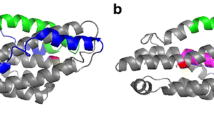Summary.
To investigate the possible involvement of the butyrylcholinesterase (BCHE) K variant and transferrin (TF) C2 variant in the manifestation of Alzheimer's disease (AD), we analyzed the BCHE, TF and apolipoprotein E (APOE) genotypes of 164 sporadic AD patients and 239 normal elderly controls.
The frequencies of the BCHE K and TF C2 did not differ between the AD patients and controls (P > 0.1). The occurrence of the APOE ε4 did not influence the distribution of the BCHE K and TF C2 variants (P > 0.1). No linkage disequilibrium between the BCHE K and TF C2 was observed either in both the AD patients and controls (P > 0.1).
In conclusion, neither the BCHE K nor the TF C2 confers a risk for AD.
Similar content being viewed by others
Author information
Authors and Affiliations
Additional information
Received February 9, 2001; accepted June 8, 2001
Rights and permissions
About this article
Cite this article
Kim, K., Jhoo, J., Lee, J. et al. Neither the butyrylcholinesterase K variant nor transferrin C2 variant confers a risk for Alzheimer's disease in Koreans. J Neural Transm 108, 1159–1166 (2001). https://doi.org/10.1007/s007020170005
Issue Date:
DOI: https://doi.org/10.1007/s007020170005




